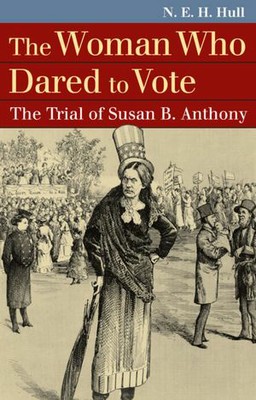
CAMDEN — As voters’ rights are debated across the nation
this year, the milestone court case granting women the right to vote has, for
the first time, been chronicled in a full-length book, thanks to a
Rutgers–Camden legal scholar.
In The Woman Who Dared to Vote: The Trial of Susan B. Anthony
(University Press of Kansas), N.E.H. Hull, a distinguished professor at the
Rutgers School of Law–Camden, details United
States v. Susan B. Anthony, a case in which America’s most prominent leader
of women’s rights was tried for illegally voting.
“This book had been one of those bucket list projects I’d
always wanted to do,” says Hull. “The woman suffrage issue was critical to the
women’s movement in the 19th century and Susan B. Anthony had not yet become
the face of woman suffrage. She was well known, but sometimes stood in the
shadows of other women. It was this trial that pushed her to the forefront of
the movement.”
Just as the polls opened in New York on Nov. 5, 1872,
Anthony cast her ballot. Before it could be placed in the ballot box, a poll
watcher objected, claiming her action violated the state constitution. Anthony
was soon after arrested, charged with a federal crime, and tried in court.
“Other women voted, but Anthony was the only one
prosecuted,” Hull says. “The federal government decided to make an example of
her by prosecuting her under a law aimed at ex-confederates.”
The Federal Enforcement Act of 1870 was passed to protect
the votes of former slaves in the South against being diluted by the votes of
whites who, among other actions, voted without having the lawful right to vote
— the grounds on which Anthony was charged.
“It became a very contemporary issue of voter suppression
and voter fraud,” Hull explains.
Each state controlled its own voting laws. In 1872, voting
in New York was restricted to men. Although Anthony’s ballot was anonymous, the
casting of her vote was considered a dilution of the all-male vote.
“The suffragists at that moment argued that as citizens of
the United States and of the state they lived in, they had the right to vote
under the Fourteenth Amendment,” Hull says. “They called on women across the
country to register to vote in a mass demonstration of civil disobedience. The
government decided to cut it off and make an example out of somebody. They went
after Susan B. Anthony.”
Hull says Anthony never thought she would be arrested. She
only assumed that her vote would be denied and she would file a civil lawsuit.
“Because she was arrested, it became a rallying cry for
woman suffrage,” Hull says. “The arrest may have short circuited the plan for
massive civil disobedience but if it was supposed to suppress the woman
suffrage movement, it failed.”
Supreme Court Justice Ward Hunt presided over the trial
and refused to allow Anthony to testify on her behalf. He also ordered the jury
to return a guilty verdict, a clear violation of the Constitutional right to
trial by jury, and read an opinion he had written before the trial even
started.
Anthony’s sentence was a $100 fine, but not imprisonment,
and she never paid. Instead, she petitioned Congress to remove the fine. The
trial became a cause célèbre and had important implications for the woman
suffrage movement.
“The trial brought women together,” Hull says. “Susan B.
Anthony became the face of woman suffrage.”
The book is the newest in the Landmark Law Cases and American Society series, for which Hull is
co-editor. The series illuminates significant American law cases, traces their
origins, brings to light their consequences, and enhances understanding of
American law and society.
N.E.H. Hull is the author of numerous books related to
legal history, including Roscoe Pound and
Karl Llewellyn: Searching for an American Jurisprudence (University of
Chicago Press) and is co-author of Roe v.
Wade: The Abortion Rights Controversy in American History and The Supreme Court: An Essential History (University
Press of Kansas).
At the Rutgers School of Law-Camden, Hull teaches courses
in American legal history, abortion rights controversy, LGBT individuals in
American legal history, and the fight over woman suffrage.
She received her undergraduate degree from Ohio State
University, her doctorate from Columbia University, and her juris doctor from
the University of Georgia School of Law.
-30-
Media Contact: Ed Moorhouse
(856) 225-6759
E-mail: ejmoor@camden.rutgers.edu


